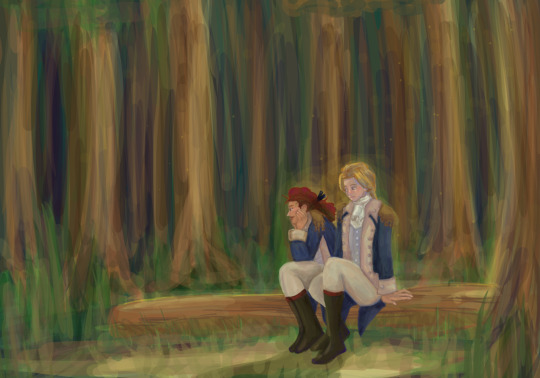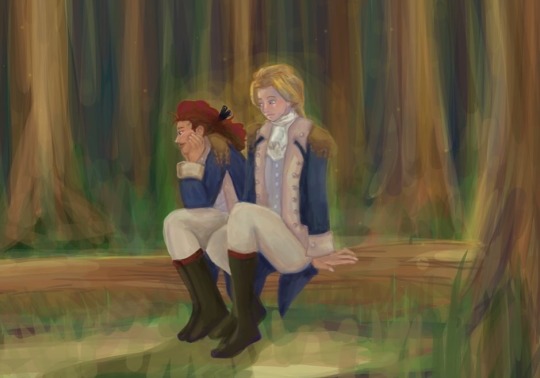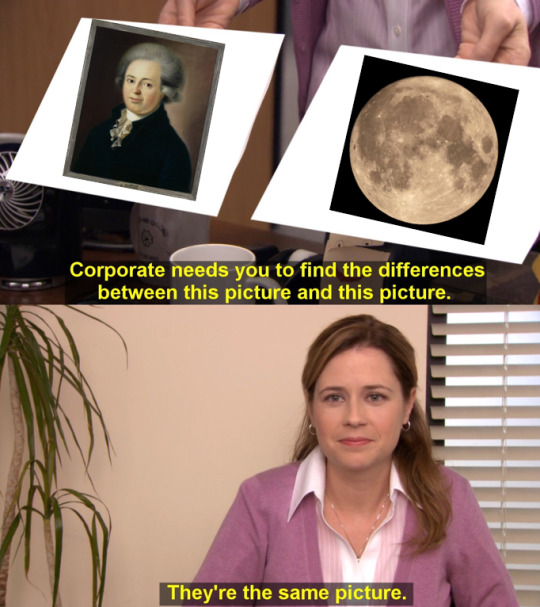Text
Since learning about Francis's sexual escapades across Europe, I've come to the conclusion that John was 100% teasing Francis about being a slut
I have been thinking about a line that John Laurens wrote to Francis Kinloch on August 23, 1774:
it grows so late that I must bid you Adieu, kiss all the pretty Genevoises for me, and dont delay to write to your affectionate John Laurens_
I don't speak French, but my understanding is that "Genevoises" is feminine plural and would translate to "Genevan women." So my question is - why did John ask Francis to kiss all of the pretty Genevan women for him?
This is the first letter John wrote to Francis after John arrived in London. He had just left Francis and their other friends behind in Geneva, a transition that was surely hard on him, as evidenced by an earlier line in the letter:
If my Letter is a little confused, dont be surpriz'd at it, for I am quite like a Creature in a new World, and shall be for some time in an unsettled State_ I am glad however to inform you that I shall not have Lodgings in the Temple as I at first thought_ but in some genteel private Family_ the Noise, the Cries the Smoak and Dust of this vast City, make me sometimes wish myself back at Paquis, I have another Reason too, for wishing myself there, I dont know when I shall get into such a valuable Set of Acquaintance as I have left_
I am of the opinion that John and Francis had a deeply romantic relationship - you can explore previous discussions about this in my Francis Kinloch tag. So what is the purpose of John asking his closest friend/lover, whom he only recently left, to kiss some pretty ladies on his behalf?
Was John being facetious? This seems like the most obvious answer, considering John rarely ever mentioned women in his other surviving writings and barely in any romantic context. Was he simply trying to make light of an emotionally trying time in his life?
Was there a hidden implication behind the words? The phrase conjures intimate images of Francis kissing people he finds attractive. Perhaps John was making a reference to kisses they'd shared in the past but veiled in a way that would not be so easily understood by other readers of the letter.
Was it performative? Was John feeling fear or uncertainty regarding his likely attraction toward men? Was he trying to make himself out to be something else?
Was John teasing Francis? Francis seems to have experienced attraction to women. A "Miss Stephens" that Francis appeared to seriously court is mentioned in a September 30, 1776 letter from John to Francis. Were there certain women in Geneva that Francis found attractive, and was John encouraging him to explore those attractions?
Or is there no hidden meaning? Did John think of the Genevan women as pretty and genuinely wish to kiss them?
A final note - I also find it interesting that the final "-es" in "Genevoises" is written detached from the rest of the word:

Is it possible that John originally wrote the word as "Genevois" (Genevan men, to my understanding) and then added the "-es" to alter the meaning? Probably not, as there is evidence that this was simply John's style of handwriting (as seen below in the word "present"), but it is something to consider.

#reblog#I have an entire post I want to make about Kinloch's sexuality#Hopefully I will have some time in the coming weeks to write it#Has anyone asked for this? No#Will I inflict it upon all of you? Yes#John Laurens#Francis Kinloch
151 notes
·
View notes
Note
dear laurens,
how would you describe your relationship with alexander hamilton? friendly? or romantic? thank you.
sincerely,
anon
Sorry, but I'm not an RP blog.
#I've had people just start roleplaying (including borderline sexual scenarios) in my ask box and messages - please don't do that#I'm not an RP blog#There are Hamilton-related RP blogs on here but I am not one#Please just check that a blog is actually a roleplayer/check that someone wants to roleplay before commencing roleplaying#ask#anonymous
10 notes
·
View notes
Text
"Sailed yesterday & ran my boat against a post off South Bay_ the day employed to very little purpose besides reading Gibbons essays."
-Francis Kinloch, in a note dated June 24, 1795
"I am between 7 & 8 & have a little horse named Popet_ adieu my dear sister_ I bathe in the Sea_"
-Frederick Kinloch (son of Francis Kinloch) to his sister (presumably his half-sister Eliza Kinloch Nelson, who lived in Virginia), in a letter from 1797
"Ben going into the Sea like Polyphemus after Ulysses &c Fredericks escape the same day when he fell out of the Boat &c what a necessary part of education swimming is &c"
-Francis Kinloch, in a note from 1797
The first quote I enjoy simply because of Francis's lack of sailing ability. The last two quotes serve as an interesting follow-up to Francis saving Lord North's son from drowning in a river - the line "what a necessary part of education swimming is" is likely a reference to both that event and Frederick's falling out of the boat. Francis appears to have been a strong swimmer, and his note above suggests he enjoyed swimming in the sea (presumably the Atlantic Ocean). It's difficult to say whether Frederick was able to swim to safety after falling out of the boat or if Francis had to jump in after his son, but it's interesting that Francis dealt with multiple swimming-related emergencies in his life. It seems likely that Francis would have taught his son how to swim, especially if they both frequented the sea.
All quotations from the “Kinloch family history and genealogy research files” in the South Carolina Historical Society Archives
9 notes
·
View notes
Text
Obliged to order our faithful affectionate dog put to death &c
Francis Kinloch, in a note dated September 16, 1797
In reality, Kinloch probably ordered one of his slaves to put the dog out of its misery, but the wording makes it sound like the dog was convicted of a serious crime and sentenced to death.
From “Kinloch family history and genealogy research files” in the South Carolina Historical Society Archives
#Reading through the Kinloch papers and this just came out of left field#Idk why the family felt compelled to include this in their timeline about Francis#Francis Kinloch#quote
17 notes
·
View notes
Text
Kinloch was still referring to Müller as a full moon 27 years later:
"Adieu_ dear Muller_ I hope to see your face rising upon me tomorrow like the full moon from behind a cloud._"
-Francis Kinloch to Johannes von Müller, in an undated letter (likely written around June 14, 1804; this was written when Kinloch and his family were visiting Geneva in 1804; Kinloch and Müller had last seen each other in Switzerland in 1777)
A Collection of Celestial Comparisons Used by Francis Kinloch to Describe Johannes von Müller
"Adieu_ My historian_ Did we live in a time of Paganism, You might be sure of being made a constellation of at Your death, for one would swear by thy visage, if I remember it right, that thou wast Brother in law at least to the full moon
Adieu my round faced Historian"
-Francis Kinloch to Johannes von Müller, in a letter dated from Paris in 1777 (date line not entirely legible; likely around April based on surrounding letters)
"Adieu, my full Moon, my next letter shall not be so great piece of precherie as this has been_"
-Francis Kinloch to Johannes von Müller, in a letter dated May 1777
"Adieu_ my dearest_ may it be My fate to Shine brighter than her whom You already exceed in the Circular form of Your Physiognomy_"
-Francis Kinloch to Johannes von Müller, in a letter dated May 30, 1777
"When is Your history to gladden my eyes? When it does, I shall change your apellation, & call You no longer the full Moon, but the rising sun, & so make haste_"
-Francis Kinloch to Johannes von Müller, in a letter dated October 12, 1777
43 notes
·
View notes
Text
You left some cards here which I shall carry with me on Monday_ it would be a pity that these memorials of our earlier years should be lost, & that Posterity should not be able to form an opinion of you from your own confessions in the year 76.
Francis Kinloch to Johannes von Müller, in an undated letter (likely written around June 23, 1804)
It's always interesting to read a line like this and realize that we are part of a long line of history lovers who have preserved those memorials and are allowing posterity to form an opinion on Johannes von Müller almost 250 years later
#Kinloch: It would be a shame if posterity forgot about my dear friend Müller#Gays on tumblr in 2024: we got you#Also shout out to all the historians who have preserved their letters over the years#Without them we would have nothing#Francis Kinloch#Johannes von Muller#Johannes von Müller#quote#The 250 estimate is based off of the 1776 date btw
12 notes
·
View notes
Text
This was just a background study but I'm able te see lams in the soup so


166 notes
·
View notes
Text


“Cold in my professions, warm in ⟨my⟩ friendships,”
172 notes
·
View notes
Text
When he [Kinloch] noticed that his friend's [Müller's] stay in Tronchin's house had become unpleasant, he offered to live with him for an indefinite period of time in order to be able to make the most of the instructive interaction with his well-read and intelligent friend. Müller's closest friends, Bonstetten, Bonnet, even Tronchin, approved the idea, and so the two young men, brought together by mutual inclination and common striving, began their summer plan on May 1, 1775. Kinloch had rented a small country house with six rooms in the village of Chambésy on the right bank of Lake Geneva, an easy hour from the city, halfway between Geneva and Versoix, one of the advantages of which was its short distance from Bonnet's estate. In addition, all the English people with whom Müller liked to socialize so much lived on this side of the lake. He felt very happy here for a long time. He wrote to Captain Peyer about the timing of the summer plan: "At 5 o'clock my friend rides into town and listens to physics. After I have worked on Swiss history, we have our breakfast at 8 a.m., during which we read Mr. Bonstetten's letters or a pleasant French writer. At 9 a.m. we study the spirit of the laws together. From 11 a.m. to 1 p.m. my friend deals with English laws, I study either national history or other sciences. I'm so happy with it that I haven't read a book about it for many months, but only unprinted documents about it. At 1 o'clock we almost always read Tacitum, the Roman Montesquieu. We eat at 2 o'clock. At 3 o'clock we read or walk or entertain or visit until 9 o'clock, when we dine at night. Busy with perfecting ourselves on both sides, we are each other's keen censors, correcting as much the mistakes we make in society and manners as those we make in reasoning. We have also invented certain words which we alone understand and which we use as a warning to one another when we notice that one of our discourses is not pleasant enough for those we deal with. If science, friendship, health, pure air, good table, good company and good conscience, not lacking funds, are the main elements of human happiness, then I am currently enjoying the most perfect one and all the more fondly because Kinloch shares them with me."
From Johannes von Müller, 1752-1809, Volume 1 by Karl Henking
The original text was in German/French/Latin and was translated with Google Translate (original below).
The fact that Kinloch and Müller developed secret code words is interesting. It sounds like they used it to discreetly correct or advise each other when in the company of others, but I wonder if they ever used it to navigate discussions of sexuality.
Als er bemerkt hatte, daß seinem Freunde der Aufenthalt im Hause Tronchins unangenehm geworden war, bot er ihm an, auf unbestimmte Zeit mit ihm zusammenzuleben, um den belehrenden Umgang mit dem belesenen und geistvollen Freund umso gründlicher ausnüßen zu können. Die nächsten Freunde Müllers, Bonstetten, Bonnet, selbst Tronchin billigten den Gedanken, und so fingen denn die beiden durch gegenseitige Neigung und gemeinsames Streben zusammengeführten Jünglinge am 1. Mai 1775 ihren Sommerplan“ an. Kinloch hatte im Dorfe Chambésy über dem rechten Ufer des Genfersees, eine leichte Stunde von der Stadt entfernt, halbwegs zwischen Genf und Versoix, ein kleines Landhaus mit sechs Zimmern gemietet, zu dessen Vorzügen auch die geringe Entfernung vom Landgute Bonnets gehörte. Zudem wohnten auf dieser Seite des Sees alle Engländer, mit denen Müller so gern verkehrte. Hier fühlte er sich nun auf längere Zeit wirklich glücklich. Über die Zeiteinteilung des Sommerplanes“ schrieb er an Hauptmann Peyer: „Um 5 Uhr reitet mein Freund in die Stadt und hört Physik. Nachdem ich indeß über die Schweizerhistorie gearbeitet, nehmen wir um 8 Uhr unser Dejeuner, unter welchem wir des Herrn v. Bonstetten Briefe oder einen angenemen französischen Schriftsteller lesen. Um 9 Uhr studieren wir miteinander den esprit des loix. Von 11-1 Uhr beschäftigt sich mein Freund mit den englischen Gesezen, ich studier entweder die vaterländische Geschichte oder andere Wissenschaften. Mit jener bin ich so glücklich, daß ich seit vielen Monaten kein Buch, sondern lauter ungedruckte Urkunden darüber gelesen habe. Um 1 Uhr lesen wir fast immer Tacitum, den römischen Montesquieu. Um 2 Uhr speisen wir. Um 3 Uhr lesen oder spazieren wir oder empfangen oder besuchen wir und das bis 9 Uhr, da wir zu Nacht speisen. Beschäftiget, uns beiderseitig zu vervollkommnen, sind wir einer des andern scharfer Censor und verbessern ebensowohl diese Fehler, welche wir in Gesellschaften und Manieren, als die, welche wir im Raisonnement machen. Wir haben auch gewisse Worte erfunden, welche wir allein verstehen und einander zur Warnung aussprechen, wenn wir bemerken, daß einer unserer Discurse denen, mit welchen wir umgehen, nicht angenem genug ist. Wenn Wissenschaften, Freundschaft, Gesundheit, reine Luft, gute Tafel, gute Gesellschaft und gutes Gewissen, non deficiente crumena, Hauptstücke der menschlichen Glückseligkeit sind, so genieße ich gegenwärtig der vollkommensten und desto lieber, da Kinloch sie mit mir theilt."
#Can't believe Kinloch and Müller invented Polari (joking)#Francis Kinloch#Johannes von Müller#Johannes von Muller#quote#Charles Victor de Bonstetten#Charles Bonnet
7 notes
·
View notes
Text
The gays or something idk

94 notes
·
View notes
Text

I'm sure he'll be fine
#accurate#fanart#Tench Tilghman#Robert Hanson Harrison#Richard Kidder Meade#Marquis de Lafayette#James McHenry#John Laurens#Alexander Hamilton
212 notes
·
View notes
Text

(tags from @littlewritingrabbit)
I mean. Have you seen the man?

A Collection of Celestial Comparisons Used by Francis Kinloch to Describe Johannes von Müller
"Adieu_ My historian_ Did we live in a time of Paganism, You might be sure of being made a constellation of at Your death, for one would swear by thy visage, if I remember it right, that thou wast Brother in law at least to the full moon
Adieu my round faced Historian"
-Francis Kinloch to Johannes von Müller, in a letter dated from Paris in 1777 (date line not entirely legible; likely around April based on surrounding letters)
"Adieu, my full Moon, my next letter shall not be so great piece of precherie as this has been_"
-Francis Kinloch to Johannes von Müller, in a letter dated May 1777
"Adieu_ my dearest_ may it be My fate to Shine brighter than her whom You already exceed in the Circular form of Your Physiognomy_"
-Francis Kinloch to Johannes von Müller, in a letter dated May 30, 1777
"When is Your history to gladden my eyes? When it does, I shall change your apellation, & call You no longer the full Moon, but the rising sun, & so make haste_"
-Francis Kinloch to Johannes von Müller, in a letter dated October 12, 1777
#It's well established that Müller had big round baby face and we love him for it#reblog#Johannes von Müller#Johannes von Muller#Francis Kinloch
43 notes
·
View notes
Text
A Collection of Celestial Comparisons Used by Francis Kinloch to Describe Johannes von Müller
"Adieu_ My historian_ Did we live in a time of Paganism, You might be sure of being made a constellation of at Your death, for one would swear by thy visage, if I remember it right, that thou wast Brother in law at least to the full moon
Adieu my round faced Historian"
-Francis Kinloch to Johannes von Müller, in a letter dated from Paris in 1777 (date line not entirely legible; likely around April based on surrounding letters)
"Adieu, my full Moon, my next letter shall not be so great piece of precherie as this has been_"
-Francis Kinloch to Johannes von Müller, in a letter dated May 1777
"Adieu_ my dearest_ may it be My fate to Shine brighter than her whom You already exceed in the Circular form of Your Physiognomy_"
-Francis Kinloch to Johannes von Müller, in a letter dated May 30, 1777
"When is Your history to gladden my eyes? When it does, I shall change your apellation, & call You no longer the full Moon, but the rising sun, & so make haste_"
-Francis Kinloch to Johannes von Müller, in a letter dated October 12, 1777
#There are other times where Kinloch refers to Müller as his full moon but I just wanted to capture the general evolution of his comparisons#Francis Kinloch#Johannes von Muller#Johannes von Müller#quote
43 notes
·
View notes
Text
Kinloch: Fellas, is it gay to call your guy friend your dear little azure-eyed historian, your lost sheep, your little laughing one, your full moon, your constellation, your rising sun?
Kinloch: Is it also gay to tell this guy friend the attractiveness of every woman you meet and provide him with descriptions of your many sexual encounters with women?
#The dichotomy of man#Kinloch has been dead for 198 slutty slutty years#I've acquired the Kinloch-Muller letters and I will be insufferable in my posting about them#What should the ship name be? Killer? Kinler? Mulloch?#Francis Kinloch#Johannes von Muller#Johannes von Müller
50 notes
·
View notes
Text

Reading Müller's descriptions of Kinloch makes me 1) question his taste in men and 2) imagine what a meeting between Müller and Laurens would have been like.
An alternative meme:

#Müller: Kinloch is the most morally perfect person :)#Laurens: What morals does that man have?#Francis Kinloch#Johannes von Müller#Johannes von Muller#John Laurens
60 notes
·
View notes
Text
We shall meet again – we shall live to look back upon all that has happen’d as upon a troubled dream, & your face will be as easy to shave as ever
Francis Kinloch to Johannes von Müller, 4 September 1803
Kinloch writes this reassuring line to his dear friend Müller in the wake of a heartbreaking scandal; Müller had recently suffered almost total financial ruin (not to mention shame and legal peril) as a result of responding to faked homoerotic love letters from a fictional Hungarian count.
This sentiment is really tender and touching for two reasons. First, it’s plain that Kinloch isn’t bothered at all by the scandal or Müller’s having been outed as homosexual (almost certainly because he was well aware of this from his own first-hand experiences in the 1770s). He even makes a point of emphasising his continuing “sincere and unalterable friendship” for Müller.
Second, Kinloch must have heard (or intuited) that the stress of the situation had robbed Müller of his famously round and soft baby-face. So, he reassures Müller that he will recover his wellness soon enough - making his now-haggard and angular face “easy to shave” again.
#I have been thinking about this line for months#Parks and Rec meme - ''It's about the intimacy of letting another man touch your face''#Francis Kinloch#Johannes von Muller#Johannes von Müller#quote
18 notes
·
View notes
